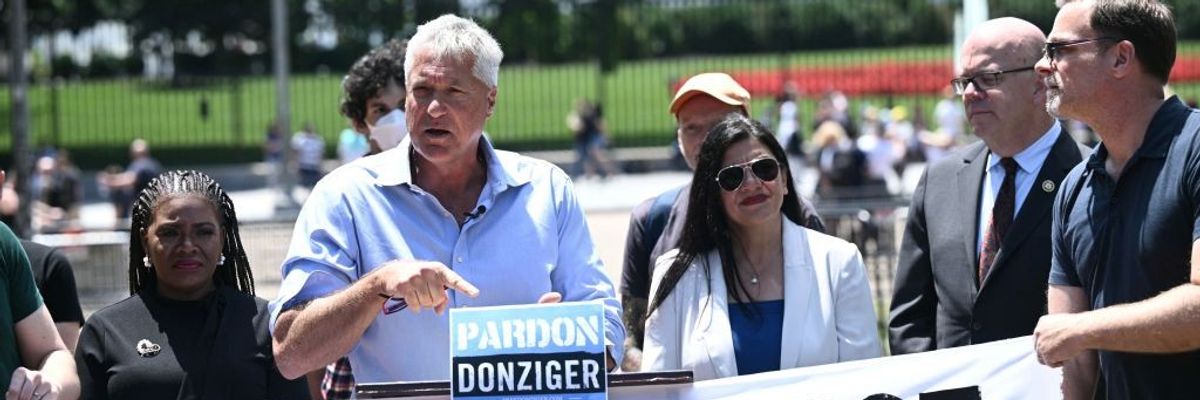"It would send a signal that President Biden, who claims to be a climate president and a rule of law president, can walk the walk, not just do the talk," said human rights attorney Steven Donziger.

Human rights lawyer Steven Donziger joins climate activists and lawmakers at a rally in front of the White House on June 12, 2024.
(Photo: Brendan Smialowski/AFP via Getty Images)
Jake Johnson
Jan 08, 2025
COMMON DREAMS
With Joe Biden's White House term ending in less than two weeks, human rights attorney Steven Donziger on Tuesday urged the outgoing president to send a message to Chevron and other oil giants around the world by granting him a pardon.
"I think it would bring enormous recognition that this is just fundamentally wrong and a violation of the Constitution," Donziger said of a pardon in an interview with Amnesty International, one of many advocacy organizations backing his petition to the president. "But more importantly, it would send a signal that President Biden, who claims to be a climate president and a rule of law president, can walk the walk, not just do the talk. And it would be a really important opportunity for him to stand up for the principles that he purports."
Donziger faced a yearslong legal assault from Chevron after he helped win a $9.5 billion settlement against the company in 2011 over oil dumped on Indigenous lands in the Amazon rainforest in Ecuador.
Donziger has spent more than 1,000 days in prison or under house arrest since 2019, when he was charged with six counts of criminal contempt of court—charges for which he was found guilty in 2021 by Loretta Preska, a judge who has served on the advisory board of the Chevron-funded Federalist Society.
The United Nations condemned Donziger's prosecution and prolonged detention as violations of international law.
Donziger, who walked free in 2022, has said he is "the only person in U.S. history to be privately prosecuted by a corporation."
"More specifically," he wrote in a blog post last year, "the government (via a pro-corporate judge) gave a giant oil company (Chevron) the power to prosecute and lock up its leading critic."
In his interview with Amnesty volunteer Elizabeth Haight, Donziger argued that "there was no basis to charge me with contempt, either civil or criminal."
"But even if there was, this was handled in an extremely irregular, and I would argue, questionable, if not outright corrupt, way," he continued. "In my case, the prosecutor looked at the evidence and refused to take the case forward. That should have been the end of it. Instead, this judge appointed a private corporate law firm to step into the shoes of the U.S. government and prosecute me directly."
Donziger said that while "the case in Ecuador does not depend on me getting a pardon... a pardon would make it clear, or even more clear, to any judge in any country who might consider enforcing the judgment against Chevron, that Chevron's entire theory that somehow they were the ones victimized by the people of Ecuador rather than the other way around, is a completely false and manufactured narrative."
With time running out, Donziger urged people to sign his petition to the Biden White House calling for a pardon—a demand backed by dozens of U.S. lawmakers.
"Sign the petition to the White House, donate—as I can't work and am reliant on the goodwill of people all over the world to help pay my legal fees and keep me and this work moving—and call the White House at +1-202-456-1111," Donziger said. "What that means is, when the operator at the White House answers, you simply say, 'I'm calling to urge President Biden to pardon Steven Donziger, this is a grave injustice, this is a stain on the reputation of our country, and it must be corrected.'"
No comments:
Post a Comment